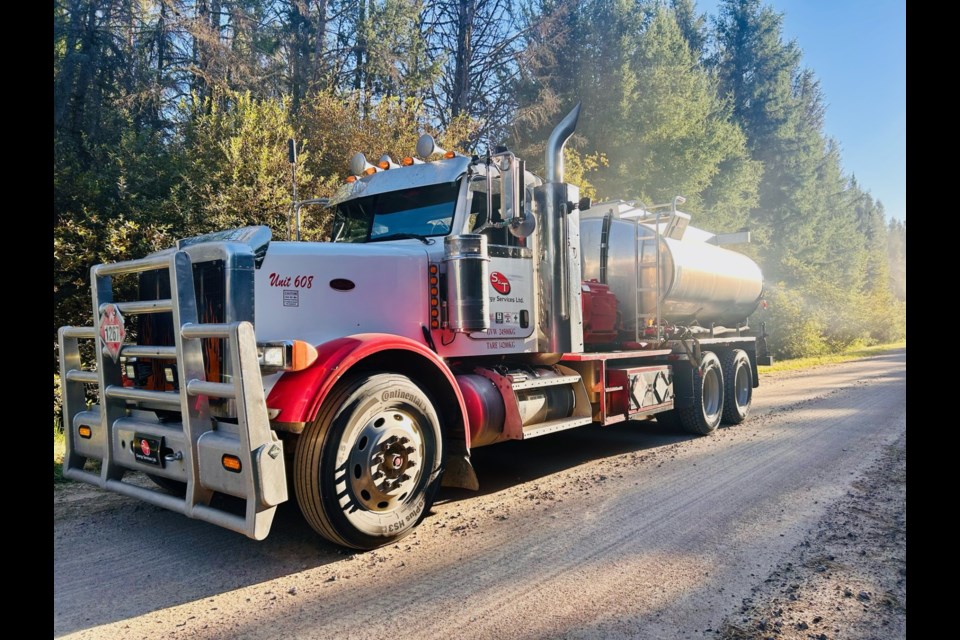LAKELAND – When many people think of truckers, they picture long-haul drivers moving goods across endless highways. For S&T Energy Services, a family-owned oilfield service company based out in Bonnyville, their drivers don’t just haul product.
Jeff Hughes, president of the company, says their truckers also operate specialized equipment, pump fluids, clean oilfield tanks, and spend as much time on location as they do on the road – helping keep Alberta’s energy industry moving.
Founded in 1981 by his parents, Sean and Terry Hughes, which is where the company’s name came from, the family business has grown from a single steamer truck operating in Edmonton to a fleet of over 55 power units and 115 employees today.
But the family business came from a humble beginning.
Hughe’s parents started washing equipment for companies like Richie Brothers Auctioneers and working for the City of Edmonton, doing sewer work just to pay the bills, he explains.
The company stepped into the oilpatch back in the mid-1980s in the Lloydminster area, growing the company to a few more steamers. But it was a tough time for Alberta’s oil patch, and his parents had to fight to keep their company afloat.
Hughes said the National Energy Program (NEP), which was created in 1980 by the Liberal government at the time, “pretty much devastated the oil patch in the area.”
“They went down to one truck... and my mom and dad worked together to get through it,” he recalls - but the business survived.
The business moved to the Elk Point area in the early 1990s, then to the Bonnyville area in the late 1990s.
After studying urban planning technology at NAIT and working in that industry for a few years, Hughes decided to join the family business full-time in 2001. Since then, he has played a key role in expanding the business and helping diversify the business’ services.
Reflecting on S&T’s evolution, Jeff says, “We’ve come a long way from waiting for the phone to ring to wash equipment back in the 80s.”
Now, the business offers 24/7 services including fluid hauling and steam cleaning on oilfield sites, to major clients such as CNRL and Cenovus. They have multiple straight-vacuum units, semi-trailer back units, combination wash back units, 5,000 PSI pressure trucks, water trucks, well-servicing flushby units, and much more.
But challenges remain.
One of the biggest challenges facing the industry today is the steep cost of obtaining a Class 1 or 3 license, he says, which is a requirement for commercial drivers.
“It's more and more difficult for someone to get into this industry.”
He adds, “A license used to be fairly easily attained, but with some parametres that came down and more restrictions,” it can now cost someone upwards of $10,000 just to get their license.
And the high cost of entry has limited the number of new drivers entering the industry.
“Because of this hurdle... we’ve been working with the government... to try to advocate for some assistance there, or to turn the licensing program into almost like an apprenticeship program, where they can kind of work as they get the experience... like other trades.”
For now, the company is taking matters into its own hands. It invests in its own employees, starting them off as labourers or ‘swampers,’ and helping them work their way up to Class 1 drivers, he says.
This approach has paid off, with many of their long-term employees rising through the ranks, from entry-level positions to supervisors.
For S&T Energy Services, the nature of the work means drivers not only spend a lot of time on the road, but they do a lot of work on a location too.
“Some of our units... driving is actually a very small part of what they do on a regular day,” he explains. “Our operators are not only professional drivers... they’re also trained to be fully competent to operate the equipment they drive,”
Different units have different requirements and specialties, and there is lots of cross-training involved, he explains.
Ultimately, Hughes says truckers play a big role in keeping the economy moving in Alberta and in Canada, and support for the industry can be done in small ways, such as motorists being aware on the road when they see big trucks travelling and working.
“We just need patience and understanding out there, because we’re all trying to do our jobs, and we’re all trying to get home to our families at the end of the day. That takes patience and understanding from everyone.”



